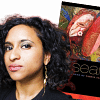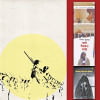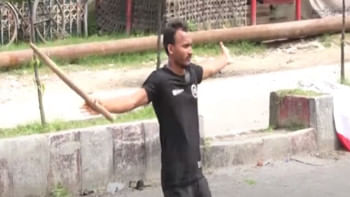Interview with a Birangona

1. What were you doing when they came for you?
Gleaming water sweeps over
Mother's feet. Bayonets. Teeth.
My green and yellow Eid sari
flaps damply between two palm
trees. Grandfather calls to me:
mishti maya. Girl of sweetness.
Aashi, I call back. I finish braiding
my hair, tie it tight. I twine a red string
around my thigh. That evening,
a blade sliced through string, through
skin, red on red on red. Kutta, the man
in khaki says. It is only later I realize
it is me he is calling dog. Dog. Dog.
2. Where did the Pakistani military take you, and were there others there?
Past the apothecary shop, shut
down, burned flat. My heart
seized, I told it to hush. They saw
its shape and weight and wanted
it too. Past the red mosque
where I first learned to touch
my forehead low, to utter
the wet words blown from
my mouth again and again. Past
the school draped with banners
imploring Free Our Language,
a rope steady around my throat
as they pushed me toward the dark
room, the silence clotted thick
with a rotten smell, dense like pear
blossoms, long strands of jute
braided fast around our wrists.
Yes, there were others there.

3. Would you consider yourself a survivor or a victim?
Each week I pull hard
the water from the well,
bathe in my sari, wring
it out, beat it against
the flattest rocks—Are you
Muslim or Bengali, they
asked again and again.
Both, I said, both—then
rocks were broken along
my spine, my hair a black
fist in their hands, pulled
down into the river again
and again. Each day, each
night: river, rock, fist—
the river wanders this way,
breaks that way, that is
always the river's play.
4. Were there other women there? Did you get along
with them?
Between us: a dark metal
bucket, our hands touching.
We pulled water together
from the muddy river we
used to sit beside before
we belonged to that smoke-
watered world missing brothers
and husbands and fathers. I ask for
Allah's forgiveness: I didn't know
I would cherish the vermilion
streak she drew into the seam of her
parted hair. I didn't know my body's
worth until they came for it. I held
her as she shook at night: pond water
scored by storm. She held me
as I shook at dawn. Don't you know
they made us watch her head fall
from the rusted blade of the old
jute machine? That they made us
made us made us made us made us?
From Seam, a book in the Crab Orchard Series in Poetry, co-published with Southern Illinois University Press. Copyright © 2014 by Tarfia Faizullah.
Tarfia Faizullah is a Pushcart winning poet and artist, born to Bangladeshi immigrant parents in Brooklyn, New York.

 For all latest news, follow The Daily Star's Google News channel.
For all latest news, follow The Daily Star's Google News channel. 







Comments